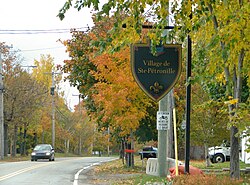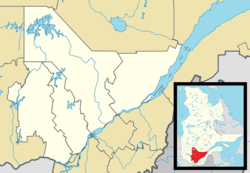Sainte-Pétronille, Quebec
Sainte-Pétronille | |
|---|---|
 | |
 Location within L'Île-d'Orléans RCM | |
| Coordinates: 46°51′N 71°08′W / 46.850°N 71.133°W[1] | |
| Country | Canada |
| Province | Quebec |
| Region | Capitale-Nationale |
| RCM | L'Île-d'Orléans |
| Constituted | January 1, 1874 |
| Named for | Saint Petronilla[1] |
| Government | |
| • Mayor | Harold Noël |
| • Federal riding | Montmorency—Charlevoix —Haute-Côte-Nord |
| • Prov. riding | Charlevoix–Côte-de-Beaupré |
| Area | |
| • Total | 4.30 km2 (1.66 sq mi) |
| • Land | 4.38 km2 (1.69 sq mi) |
| There is an apparent contradiction between two authoritative sources | |
| Population | |
| • Total | 1,055 |
| • Density | 235.9/km2 (611/sq mi) |
| Time zone | UTC−5 (EST) |
| • Summer (DST) | UTC−4 (EDT) |
| Postal code(s) | |
| Area code(s) | 418 and 581 |
| Highways | |
| Website | www |
Sainte-Pétronille is a village municipality in the L'Île-d'Orléans Regional County Municipality in the Capitale-Nationale region of Quebec, Canada. It is situated on the south-western tip of Orléans Island, facing Quebec City.
Former notable residents include the Boswell family, who owned the Boswell Brewery in Quebec City from 1843 to 1952, and painter Horatio Walker, whose workshop remains.
History[edit]

In 1651, Jesuit missionaries came to the island and established a mission for Huron Indians who were displaced by attacking Iroquois. In 1759, General James Wolfe installed his headquarters there to monitor Quebec City and the two river channels of the Saint Lawrence River. After his victory at the Battle of the Plains of Abraham, the area became inhabited by well-to-do English colonists who were attracted by its romantic landscapes and its renowned microclimate. Consequently the cottage-style houses and garden landscaping gave the place a decidedly English character.[1][4]
Since the topography was not well-suited for agriculture, the place became a fashionable summer resort by the mid 19th century. Hundreds of daytrippers would travel to Sainte-Pétronille by ferry for a Sunday stroll. In 1868, it became home to North America's first golf course, a three-hole course.[1][4]
The religious parish of Sainte-Pétronille de Beaulieu was formed in 1870, named after Saint Petronilla (a Roman martyr of the first century), and honouring Jacques Gourdeau, sieur de Beaulieu et de la Grossardière, feudal lord of the area in the mid-17th century. The post office opened a year later under the name Beaulieu. In 1874, the Village Municipality of Beaulieu was established by separating from Saint-Pierre, becoming the youngest of the 6 municipalities on Orleans Island.[1]
Since the village itself was almost exclusively called Sainte-Pétronille in common use, the municipality was renamed to its current name in 1980. The post office followed suit in 1991.[1]
Demographics[edit]
| Year | Pop. | ±% |
|---|---|---|
| 1976 | 801 | — |
| 1981 | 982 | +22.6% |
| 1986 | 1,068 | +8.8% |
| 1991 | 1,128 | +5.6% |
| 1996 | 1,090 | −3.4% |
| 2001 | 1,038 | −4.8% |
| 2006 | 1,060 | +2.1% |
| 2011 | 1,041 | −1.8% |
| 2016 | 1,033 | −0.8% |
| 2021 | 1,055 | +2.1% |
| Source: Statistics Canada[5] | ||
In the 2021 Census of Population conducted by Statistics Canada, Sainte-Pétronille had a population of 1,055 living in 463 of its 509 total private dwellings, a change of 2.1% from its 2016 population of 1,033. With a land area of 4.32 km2 (1.67 sq mi), it had a population density of 244.2/km2 (632.5/sq mi) in 2021.[6]
| 2021 | 2016 | 2011 | |
|---|---|---|---|
| Population | 1,055 (+2.1% from 2016) | 1,033 (-0.8% from 2011) | 1,041 (-1.8% from 2006) |
| Land area | 4.32 km2 (1.67 sq mi) | 4.38 km2 (1.69 sq mi) | 4.58 km2 (1.77 sq mi) |
| Population density | 244.4/km2 (633/sq mi) | 235.9/km2 (611/sq mi) | 227.2/km2 (588/sq mi) |
| Median age | 54.4 (M: 55.6, F: 51.6) | 52.4 (M: 52.8, F: 51.8) | 49.8 (M: 49.9, F: 49.8) |
| Private dwellings | 465 (total) | 495 (total) | 495 (total) |
| Median household income | $93,696 | $86,994 |
| Canada Census Mother Tongue - Sainte-Pétronille, Quebec[5] | ||||||||||||||||||
|---|---|---|---|---|---|---|---|---|---|---|---|---|---|---|---|---|---|---|
| Census | Total | French
|
English
|
French & English
|
Other
| |||||||||||||
| Year | Responses | Count | Trend | Pop % | Count | Trend | Pop % | Count | Trend | Pop % | Count | Trend | Pop % | |||||
2011
|
1,040
|
1,020 | 98.08% | 10 | 0.96% | 0 | 0.00% | 10 | 0.96% | |||||||||
2006
|
1,060
|
1,005 | 94.81% | 30 | 2.83% | 0 | 0.00% | 25 | 2.36% | |||||||||
2001
|
1,040
|
1,030 | 99.04% | 0 | 0.00% | 0 | 0.00% | 10 | 0.96% | |||||||||
1996
|
1,090
|
1,055 | n/a | 96.79% | 15 | n/a | 1.38% | 0 | n/a | 0.00% | 20 | n/a | 1.83% | |||||
Local government[edit]
List of former mayors:
- Jacques Grisé (2001–2009)
- Harold Noël (2009–present)
See also[edit]
References[edit]
- ^ a b c d e f "Sainte-Pétronille (Municipalité de village)" (in French). Commission de toponymie du Québec. Retrieved 2009-10-20.
- ^ a b "Répertoire des municipalités: Geographic code 20030". www.mamh.gouv.qc.ca (in French). Ministère des Affaires municipales et de l'Habitation.
- ^ a b "Sainte-Pétronille, Quebec (Code 2420030) Census Profile". 2016 census. Government of Canada - Statistics Canada.
- ^ a b "Sainte-Pétronille". Île d'Orléans Tourism. Archived from the original on 2009-09-07. Retrieved 2009-10-20.
- ^ a b 1996, 2001, 2006, 2011, 2016, 2021census
- ^ "Population and dwelling counts: Canada, provinces and territories, and census subdivisions (municipalities), Quebec". Statistics Canada. February 9, 2022. Retrieved August 28, 2022.
- ^ "2021 Community Profiles". 2021 Canadian Census. Statistics Canada. February 4, 2022. Retrieved 2022-04-27.
- ^ "2016 Community Profiles". 2016 Canadian Census. Statistics Canada. August 12, 2021. Retrieved 2021-04-26.
- ^ "2011 Community Profiles". 2011 Canadian Census. Statistics Canada. March 21, 2019. Retrieved 2014-04-18.
- ^ "2006 Community Profiles". 2006 Canadian Census. Statistics Canada. August 20, 2019.
- ^ "2001 Community Profiles". 2001 Canadian Census. Statistics Canada. July 18, 2021.

